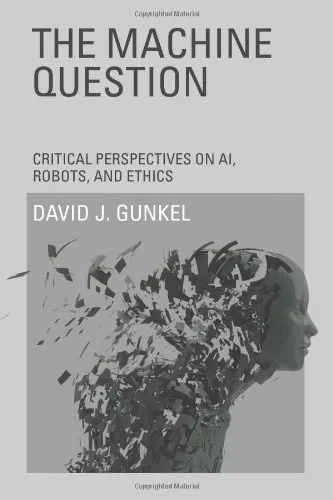The Machine Question: Critical Perspectives on AI, Robots, and Ethics
4.0
بر اساس نظر کاربران

شما میتونید سوالاتتون در باره کتاب رو از هوش مصنوعیش بعد از ورود بپرسید
هر دانلود یا پرسش از هوش مصنوعی 2 امتیاز لازم دارد، برای بدست آوردن امتیاز رایگان، به صفحه ی راهنمای امتیازات سر بزنید و یک سری کار ارزشمند انجام بدینکتاب های مرتبط:
مقدمه کتاب
کتاب «The Machine Question: Critical Perspectives on AI, Robots, and Ethics» که به قلم دیوید جی. گانکل نوشته شده است، به یکی از پرسشهای اساسی و مهم در عصر حاضر میپردازد: آیا ماشینها و رباتها نیز میتوانند بر اساس اصول اخلاقی ارزیابی و قضاوت شوند؟ این کتاب که یک بررسی جامع از مفاهیم اخلاقی در ارتباط با AI و رباتها ارائه میدهد، در تلاش است تا پیامدهای اخلاقی و فلسفی تعامل انسان با ماشینها را تحلیل کند.
خلاصهای جامع از کتاب
«The Machine Question» به بررسی این موضوع میپردازد که چگونه ماشینها به عنوان موجوداتی که ممکن است حقوق و مسئولیت داشته باشند، دیده شوند. کتاب در چهار بخش اصلی سازماندهی شده است. بخش اول به تاریخچه و فلسفه اخلاق AI میپردازد و زمینههای لازم برای درک مسائل اخلاقی مرتبط با ماشینها را فراهم میکند. در بخش دوم، نویسنده مفاهیم مرتبط با عاملیت و مسئولیت را در رابطه با ماشینها و AI تحلیل میکند. بخش سوم به سوالات حقوقی و سیاسی مرتبط با حقوق و وظایف ماشینها میپردازد. سرانجام، بخش چهارم به آیندهنگری و چالشهای فلسفی و اخلاقی که انسانها و ماشینها با آن مواجه هستند، اختصاص دارد.
نکات کلیدی
- درک مفهوم عاملیت در ماشینها و چگونگی ارزیابی آن از دیدگاه فلسفی و اخلاقی.
- تحلیل پیامدهای اخلاقی در مسائل روزمره ای که به تصمیمگیریهای رباتیک مربوط میشود.
- بحث درباره حقوق احتمالی ماشینها و اینکه آیا آنها میتوانند و باید در نظامهای حقوقی گنجانیده شوند.
- پیشنهاد چارچوبهای جدید برای اندیشیدن به تعامل انسان-ماشین و نوع نگاه به آینده در این حوزه.
نقل قولهای معروف از کتاب
یکی از جملات معروف کتاب به این شکل است: «آینده جوامع ما بستگی به نحوه تعامل ما با موجوداتی دارد که روز به روز شبیهتر به ما میشوند.» این جمله به وضوح نشان میدهد که نویسنده چگونه به آینده نگریسته و اهمیت اخلاق در فناوریهای آینده را یادآور میشود.
چرا این کتاب مهم است؟
از آنجا که فناوری AI و رباتیک به سرعت در حال پیشرفت است، درک درست از چالشهای اخلاقی و فلسفی مرتبط با این تکنولوژیها اهمیت بیشتری پیدا میکند. کتاب «The Machine Question» از جمله آثار نادری است که نه تنها به بررسی این مسائل پرداخته بلکه پیشنهاداتی ملموس برای مواجهه با این چالشها ارائه میدهد. این کتاب نه تنها برای فلاسفه و متخصصان تکنولوژی مفید است، بلکه برای هر کسی که به آینده انسانیت و فناوری علاقهمند است، خواندنی خواهد بود.
Welcome to the complex and thought-provoking world of The Machine Question: Critical Perspectives on AI, Robots, and Ethics, a seminal work by David J. Gunkel. This book challenges our perceptions of artificial intelligence and robotic autonomy, exploring the moral and ethical implications of these burgeoning technologies. As machines become increasingly pervasive in our society, understanding the questions they pose to traditional ethical frameworks is crucial. This introduction provides an in-depth overview of the book’s content and significance.
Detailed Summary of the Book
The Machine Question delves into the ethics surrounding AI and robotic systems, challenging the reader to consider machines as entities deserving of moral consideration. The book is structured around the central question: Should machines be granted moral status, and if so, on what basis? To address this inquiry, Gunkel draws from a rich tapestry of philosophical, ethical, and technological insights.
The book is divided into three main parts. Firstly, Gunkel reviews historical and contemporary perspectives on ethics in technology, detailing how thinkers have traditionally approached the moral status of machines. The second section critically assesses the current landscape of AI and robotics, examining how these technologies are integrated into human environments and the ethical concerns they raise, such as autonomy, responsibility, and the concept of agency. Finally, the book proposes a new framework for considering machine ethics, advocating for a shift in how moral agency is perceived and applied to synthetic entities.
Key Takeaways
- The concept of moral consideration is not exclusive to humans and other biological entities; machines challenge this traditional distinction.
- Current ethical frameworks may be inadequate for addressing the nuanced complexities introduced by AI and robotics.
- Gunkel encourages a reevaluation of the criteria used to grant moral status, arguing that machines with certain capabilities may deserve ethical consideration.
- The book advocates for interdisciplinary dialogues, incorporating insights from technology, philosophy, and ethics to navigate the machine question effectively.
Famous Quotes from the Book
Gunkel’s insights resonate through several thought-provoking quotes:
"The question is not whether machines can act like humans, but whether machines deserve to be treated with the moral consideration we typically afford to humans."
"To ask the machine question is not merely to extend the boundaries of moral concern, but to reconsider the very nature of agency and responsibility."
Why This Book Matters
The Machine Question occupies a crucial space in contemporary debates about the implications of artificial intelligence and robotics. As technological advancements continue to accelerate, society must grapple with the ethical dimensions of integrating machines into everyday life. Gunkel’s work is essential reading for ethicists, technologists, and policy-makers, providing a rigorous analysis of how traditional ethics can evolve to accommodate artificial agents.
Moreover, the book’s emphasis on interdisciplinary approaches highlights the need for collaborative efforts across various fields to address the multifaceted challenges posed by AI and robotics. By pushing the boundaries of ethical inquiry, The Machine Question urges readers to reconsider preconceived notions about intelligence, agency, and moral worth, ultimately fostering a more inclusive and forward-thinking discourse on the future of technology.
دانلود رایگان مستقیم
شما میتونید سوالاتتون در باره کتاب رو از هوش مصنوعیش بعد از ورود بپرسید
دسترسی به کتابها از طریق پلتفرمهای قانونی و کتابخانههای عمومی نه تنها از حقوق نویسندگان و ناشران حمایت میکند، بلکه به پایداری فرهنگ کتابخوانی نیز کمک میرساند. پیش از دانلود، لحظهای به بررسی این گزینهها فکر کنید.
این کتاب رو در پلتفرم های دیگه ببینید
WorldCat به شما کمک میکنه تا کتاب ها رو در کتابخانه های سراسر دنیا پیدا کنید
امتیازها، نظرات تخصصی و صحبت ها درباره کتاب را در Goodreads ببینید
کتابهای کمیاب یا دست دوم را در AbeBooks پیدا کنید و بخرید
1397
بازدید4.0
امتیاز50
نظر98%
رضایتنظرات:
4.0
بر اساس 0 نظر کاربران
"کیفیت چاپ عالی بود، خیلی راضیام"
Questions & Answers
Ask questions about this book or help others by answering
No questions yet. Be the first to ask!



